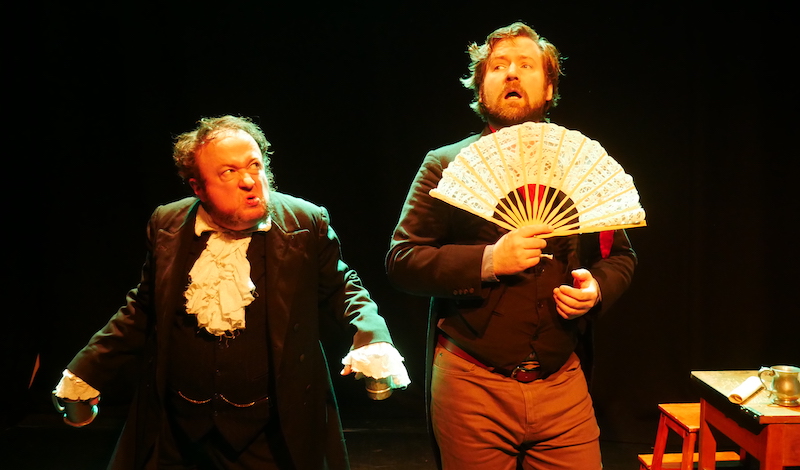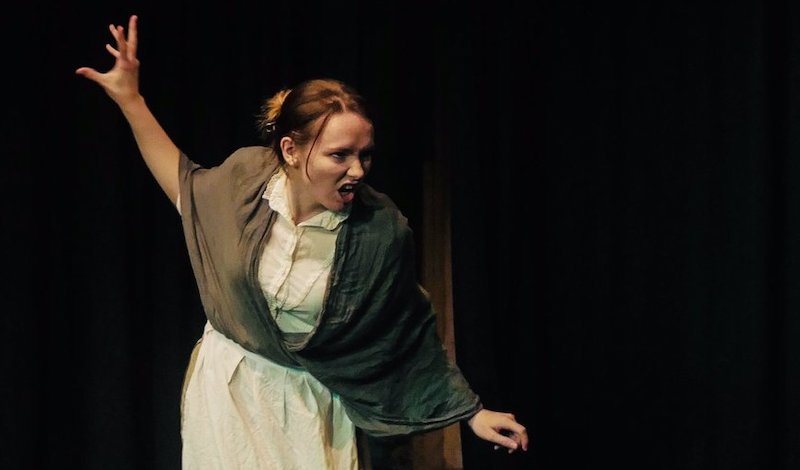The Grandmothers Grimm
★★★★☆ Hallowe’en treat
Traverse: Tue 31 Oct, Wed 1 Nov 2023
Review by Suzanne O’Brien
Regardless which versions of fairy tales by the likes of Grimm, Perrault, Disney or Carter you are familiar with, there is no denying the darkness within them. Lesser known, is that the history of the tales is perhaps just as dark, twisted, and entertaining as the tales themselves.
Some Kind of Theatre’s bold feminist drama The Grandmothers Grimm explores the role of women in the creation of the Brothers Grimm’s famous anthology and acknowledges the unknown voices behind the tales. It also highlights how fairy tales and folk tales have constantly evolved throughout their existence and does so by giving the audience a fascinating insight into how the brothers adapted them.
Written and directed by Emily Ingram, this pacey 70-minute show is set over a single evening in which the German author Marie Hassenpflug (Sophie Harris) joins the Grimm brothers Jacob and Wilhelm (Justin Skelton and Gerry Kielty) and their maid, Marie Muller (Emily Ingram), in a writing session. The long evening is spent acting out various tales and addressing creative differences.
It is clear early on that Hassenpflug was an incredibly important source for Grimm’s tales including Red Riding Hood and Sleeping Beauty. Immediately prompting the question of who the real authors of these tales are.
self-assurance
Harris’s strong-minded Marie Hassenpflug constantly challenges the brothers and gets heavily involved in the process of telling and rewriting the tales. She has a self-assurance about her, yet despite this, she is pushed aside – particularly when she is advocating for the women at the centre of the tales.
The brothers are depicted in a negative light, using the words of others and modifying them to suit their desires and intended outcome without giving credit where it is due.
Skelton and Kielty’s passionate performances ensure that the friction between the two brothers is apparent. Their different tastes lead to engaging moments of tension; Jacob seeks to write accurate versions of the stories, with the aim of making the German people proud of their culture; Wilhelm’s approach is to make them more suitable to children and include morals.
There is plenty of gore, violence and graphic details in the stories told and it is important to note that although the piece is about fairy tales – which are now heavily associated with children – this production is aimed at an older audience.
All is not terrifying, however. Ingram’s writing balances these much darker and sinister elements with humour so that the piece never strays far away from the next laugh.
all is what it seems
It does err on the side of being repetitive as the process of telling, rewriting, and arguing between the characters remains similar throughout. However, the company of four work well together with minimal set, music and lighting, relying on strong and engaging performances from all. They really throw themselves into the storytelling as they become the creatures and characters in the tales, including an innocent Red Riding Hood, a promiscuous prince, a grotesque pig and. perhaps less willingly, the fairies.
In this production, women are rightfully remembered and Hassenpflug’s input goes to highlight the people and particularly women who have not been rightfully acknowledged for their work.
It may be dark, but this piece reminds us that not all is what it seems.
Running time: One hour and 10 minutes (no interval)
Traverse Theatre, 10 Cambridge Street, EH1 2ED.
Tue 31 Oct/Wed 1 Nov 2023.
Evenings: 8pm. (Traverse 2).
Tickets and details: Book here.
ENDS




















